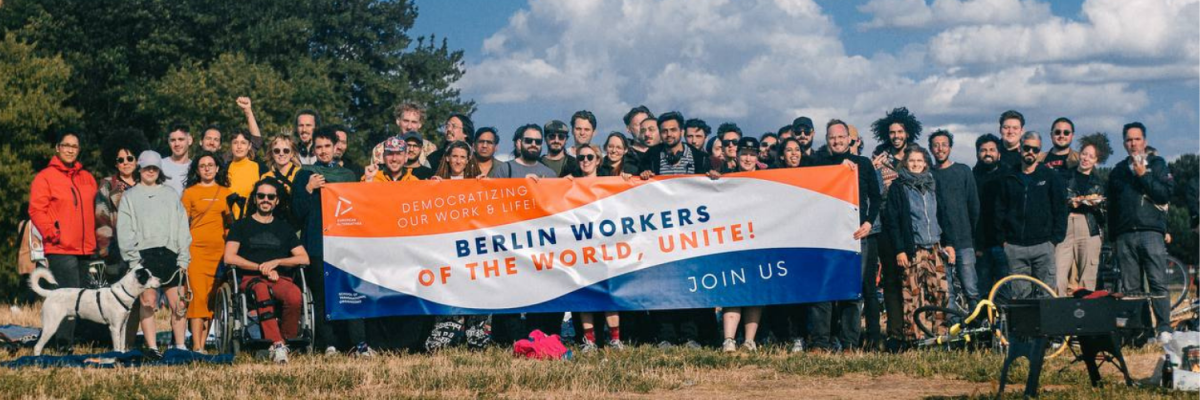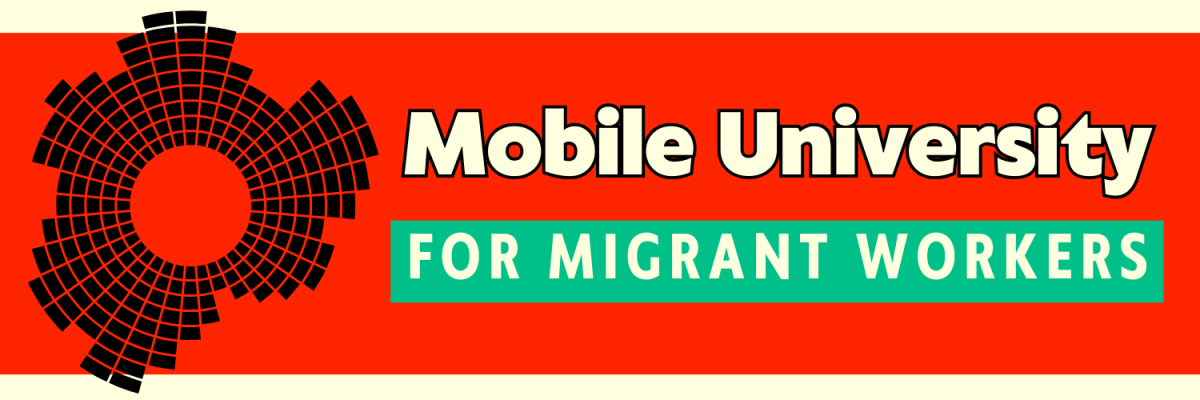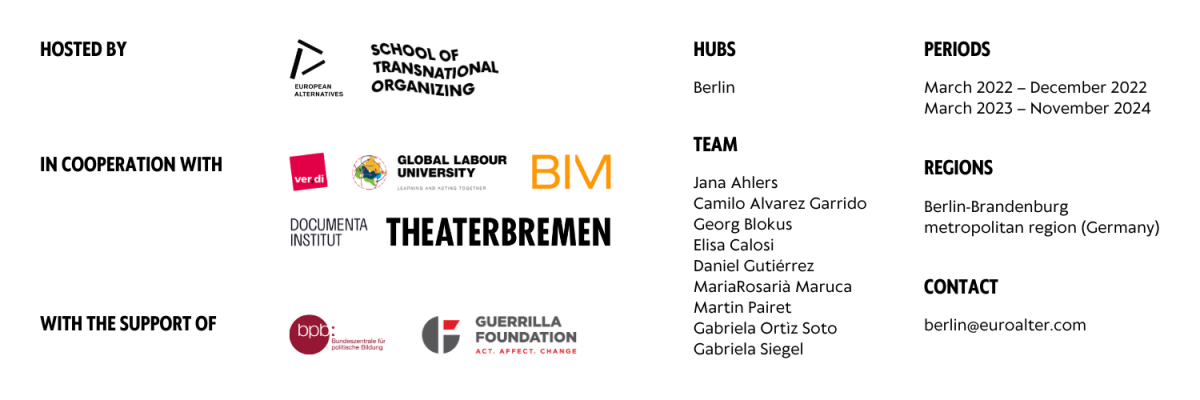Mobile University for Migrant Workers

An Organizing-Based Transformative Education Program for Migrant, Mobile, and Marginalised Workers in Berlin
The Mobile University for Migrant Workers is a transformative education program opening up new pathways to political change from the grassroots in times of deep economic and ecological crises.
In Germany's post-war history, it was guest workers who not only provided their labor to fuel the ‘Wirtschaftswunder’ of the German society, but who also fought passionately with wildcat strikes and other forms of political self-organization for the bare minimum of dignity and rights to which all of us should be equally entitled.
In recent years, we can see migrant workers using diverse tactics to organize and improve their working conditions. Whether fighting for greater workplace protections to avoid exposing themselves and their loved ones to COVID-19 during the pandemic, filing lawsuits to hold big and small companies accountable when they commit wage theft, or by resisting the demand to work unsafely during extreme weather events, it is again migrant workers who continue to demonstrate a tenacity to fight back economic, social, and political injustice.
In the Berlin-Brandenburg metropolitan region, it is mainly young mobile and marginalized workers from the world over who fight for workers' rights, build community spaces, and gain political self-confidence despite many closed doors, barriers and obstacles. It’s these workers collectives and grassroots coalitions that build the much needed power that ensures that a future of care and solidarity appears on the horizon.
A Political Learning Journey By, With and For Both the Pioneers & the Newcomers in Migrant Worker Organizing
Throughout human history, it is often the most precarious and vulnerable – women*, Black folks, queer communities, the poor, and the younger generation – who put themselves on the line to fight for the common good that the rest of society takes for granted.
Along the way, it is not just a matter of winning political support and building social majorities through democratic goodwill. On the one hand, migrant workers who organize politically are personally affected by the intersecting legal, social and material hardships that make them susceptible to exploitation, exclusion, or even deportation. On the other hand, these frontline communities often face severe political oppression, repression and depression making the struggle sometimes nearly impossible because being an ‘essential worker’ (delivery, logistics, care, tech, restaurants, etc.) goes hand in hand with the experience that worker participation, works councils, and political self-organization are fought against by so-called 'union busting' or the general law.
What could happen when we help connect these grassroots organizing initiatives, often isolated to their specific industrial sectors? How would encounters and exchanges contribute to learning about each other’s diverse political needs and struggles, but also to finding out which shared demands and interests. And why shouldn’t the many advanced organizers and newcomers be able to bring the organizational infrastructures and mutual solidarity networks to the next level?

Democratizing Our Lives, Workplaces & Futures through Community, Learning & Organizing
We, the team of the School of Transnational Organizing, host the Mobile University for Migrant Workers because we believe that political learning spaces play a key role in supporting existing initiatives led by directly-impacted communities. These kinds of spaces exist to empower key actors and movements to reach out to those more precarious migrant and working-class people - with or without prior political experience - and inspire these newcomers to join and take political leadership as worker organizers in the ‘new workers’ movement’ in Germany and Europe.
Prior to the pandemic, we began researching the field of migrant labor in a report on the situation of young mobile workers in the EU and its work perspectives in the aftermath of the last financial crisis. Finally, when Covid-19 hit the planet, we organized a series of Workers Without Borders online forums, which resulted in another report on best practices and policy demands of essential workers in the platform economy, the care industry and the agricultural sector. And finally, in a third report on the situation of workers from the Western Balkans, we have analyzed the real-life-and-work effects of the German 'West Balkans regulation.’
Finally, in 2022, we have seen enough evidence for the necessity to launch the Mobile University for Migrant Workers and to build up a community of worker organizers and educators willing to reflect on their experiences, to share their stories and skills, and to learn new cutting-edge worker organizing methods and tools.
A series of political community reunions, trainings on workers' rights, powers and histories of migrant self-organization in Germany, and a fellowship programme for advanced migrant worker organizing trainers formed the core. Finally, at our Migrant Workers' Summit with the Documenta Institute and the Global Labour University in Kassel and 'Syndicat!', our Transnational Workers' Organizing Summit at Theater Bremen, with 50 participants each, we learned practices of relational organizing that focus on stories, emotions, and listening campaigns, and discussed transnational community-based strategies for migrant, labor, and climate justice using works councils, policy changes, and collective ‘Bargaining for the Common Ecological Good’.
In the following two years, we want to make the next steps on our common journey together with partners from counseling centers like BEMA, but also trade unions and migrant self-organizations using different pedagogical methods and participatory formats:
Political German Language Course
Based on the principles of 'popular education' this course hosted by our friends from Centro Educación Popular Lohana Berkins will equip migrant worker organizers with the language skills needed to participate in German politics and to develop a common political voice.
Workers’ Rights & Relational Organizing Workshops
Together, immigrant communities will learn knowledge, skills and tools to exercise their rights, become bigger and stronger through grassroots power, and gain political leadership for far-reaching structural and institutional change.
Migrant Worker Organizing Fellowship Program
We will work with a small cohort of worker organizers - leaders in their respective communities and works councils - to strengthen the impact of their initiatives and their community-based work.
Transnational Worker Center Online Training Series
In a transnational discussion series, we will discuss the practical opportunities and challenges migrant workers face in building ‘Worker Centers’ for immigrant communities as lasting infrastructures places for mutual solidarity, legal advice, popular education and worker organizing.
Migrants Have the Power to Change the Direction Our Societies Go
In the end, initiatives such as the migrant-led Berlin Worker Center, but also the various delivery riders’ collectives, the Berlin Tech Workers Coalition, and many others, and many others, indicate a pressing need for this new workers’ movement to find a political home that is deeply transformative, and where migrant worker communities can build our mutual trust and political power to care for one another as we would like to.
The Mobile University for Migrant Workers is where these different communities can come together, discuss which jobs should be expanded, transformed or abolished in the future in order to build an economy that serves us all, learn new ways to reach working-class communities left behind by institutional politics and labor organizing, and put all those to the center who are too often relegated to the margins. Because with a view from the future, it will have been migrant worker communities and their political leaders again, who fought through new structures of established labor unions, bargained for collective agreements for the common good, and pushed for socio-ecological policies and laws leaving no migrant behind.
Stay Up to Date about Our Workshops & Resources
